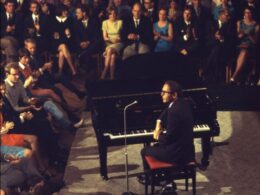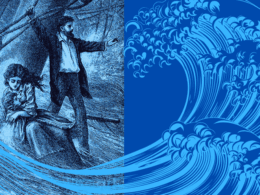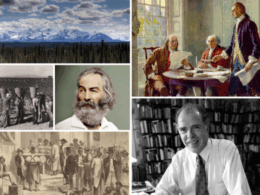(Continued from “Read, discuss: Fifty of the most memorable opening lines in American novels”)
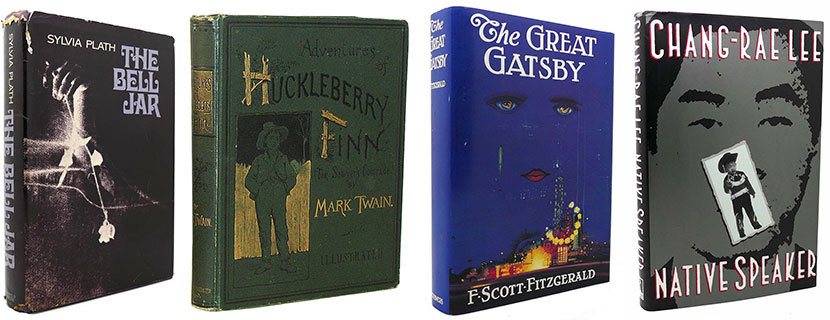
1. Nobody died that year.
— Renata Adler, Speedboat (1976)
2. We are talking now of summer evenings in Knoxville, Tennessee in the time that I lived there so successfully disguised to myself as a child.
— James Agee, A Death in the Family (1958)
3. Everyone had always said that John would be a preacher when he grew up, just like his father.
— James Baldwin, Go Tell It on the Mountain (1953)
4. “Are you sure, sweetheart, that you want to be well?”
— Toni Cade Bambara, The Salt Eaters (1980)
5. Early in 1880, in spite of a well-founded suspicion as to the advisability of perpetuating that race which has the sanction of the Lord and the disapproval of the people, Hedvig Volkbein, a Viennese woman of great strength and military beauty, lying upon a canopied bed of a rich spectacular crimson, the valance stamped with the bifurcated wings of the House of Hapsburg, the feather coverlet an envelope of satin on which, in massive and tarnished gold threads, stood the Volkbein arms—gave birth, at the age of forty-five, to an only child, a son, seven days after her physician predicted that she would be taken.
— Djuna Barnes, Nightwood (1936)
6. I am an American, Chicago born—Chicago, that somber city—and go at things as I have taught myself, freestyle, and will make the record in my own way: first to knock, first admitted; sometimes an innocent knock, sometimes a not so innocent.
— Saul Bellow, The Adventures of Augie March (1953)
7. This was a Golden Age, a time of high adventure, rich living and hard dying . . . but nobody thought so.
— Alfred Bester, The Stars My Destination (1956)
8. I had this story from one who had no business to tell it to me, or to any other.
— Edgar Rice Burroughs, Tarzan of the Apes (1914)
9. I lost an arm on my last trip home.
— Octavia Butler, Kindred (1979)
10. A green and yellow parrot, which hung in a cage outside the door, kept repeating over and over: “Allez-vous-en! Allez vous-en! Sapristi! That’s all right!”
— Kate Chopin, The Awakening (1899)
11. Her first name was India—she was never able to get used to it.
— Evan Connell, Mrs. Bridge (1959)
12. There is nothing in which American Liberty, not always as much restrained as it might be, has manifested a more decided tendency to run riot, than in the use of names.
— James Fenimore Cooper, The Crater; or, Vulcan’s Peak (1847)
13. Once a guy stood all day shaking bugs from his hair.
— Philip K. Dick, A Scanner Darkly (1977)
14. From a little after four o’clock until almost sundown of the long still hot weary dead September afternoon they sat in what Miss Coldfield still called the office because her father had called it that—a dim hot airless room with the blinds all closed and fastened for forty-three summers because when she was a girl someone had believed that sight and moving air carried heat and that dark was always cooler, and which (as the sun shone fuller and fuller on that side of the house) became latticed with yellow slashes full of dust motes which Quentin thought of as being flecks of the dead old dried paint itself blown inward from the scaling blinds as wind might have blown them.
— William Faulkner, Absalom, Absalom! (1936)
15. In my younger and more vulnerable years my father gave me some advice that I’ve been turning over in my mind ever since.
— F. Scott Fitzgerald, The Great Gatsby (1925)
Gatsby‘s concluding sentence, of course, is equally famous: “So we beat on, boats against the current, borne back ceaselessly into the past.”
16. Who listens?
— Paula Fox, Poor George (1967)
17. Now folks today we’re going to auction off Missus Pimber’s things.
— William Gass, Omensetter’s Luck (1966)
18. I first heard Personville called Poisonville by a red-haired mucker named Hickey Dewey in the Big Ship in Butte.
— Dashiell Hammett, Red Harvest (1929)
19. I get the willies when I see closed doors.
— Joseph Heller, Something Happened (1974)
20. Ships at a distance have every man’s wish on board.
— Zora Neale Hurston, Their Eyes Were Watching God (1937)
21. She waited, Kate Croy, for her father to come in, but he kept her unconscionably, and there were moments at which she showed herself, in the glass over the mantel, a face positively pale with the irritation that had brought her to the point of going away without sight of him.
— Henry James, The Wings of the Dove (1902)
22. Every summer Lin Kong returned to Goose Village to divorce his wife, Shuyu.
— Ha Jin, Waiting (1999)
23. In the Oakland Greyhound all the people were dwarfs, and they pushed and shoved to get on the bus, even cutting in ahead of the two nuns, who were there first.
— Denis Johnson, Angels (1983)
24. There were 117 psychoanalysts on the Pan Am flight to Vienna and I’d been treated by at least six of them.
— Erica Jong, Fear of Flying (1973)
25. Riding up the winding road of Saint Agnes Cemetery in the back of the rattling old truck, Francis Phelan became aware that the dead, even more than the living, settled down in neighborhoods.
— William Kennedy, Ironweed (1984)
26. “There are dragons in the twins’ vegetable garden.”
— Madeleine L’Engle, A Wind in the Door (1973)
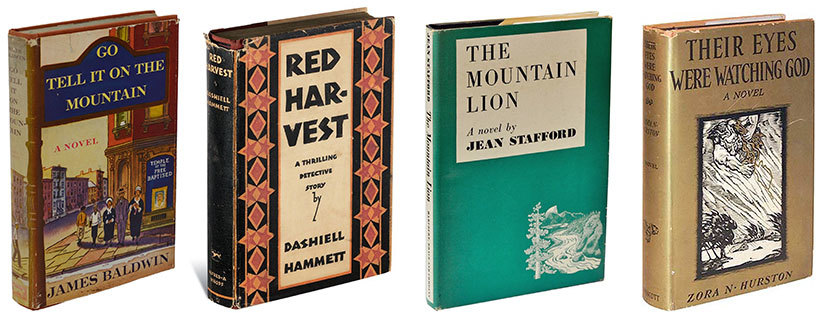
27. It was the last letter in Irene Redfield’s little pile of morning mail.
— Nella Larsen, Passing (1929)
28. I’ll make my report as if I told a story, for I was taught as a child on my homeworld that Truth is a matter of the imagination.
— Ursula K. Le Guin, The Left Hand of Darkness (1969)
29. The day my wife left she gave me a list of who I was.
— Chang-rae Lee, Native Speaker (1995)
30. In the beginning, sometimes I left messages in the street.
— David Markson, Wittgenstein’s Mistress (1988)
31. “What does he mean, ‘I suppose you want an explanation’? He doesn’t explain anything.”
— Harry Matthews, Cigarettes (1987)
32. See the child.
— Cormac McCarthy, Blood Meridian: Or the Evening Redness in the West (1985)
33. In the town there were two mutes, and they were always together.
— Carson McCullers, The Heart Is a Lonely Hunter (1940)
34. At sunrise on a first of April, there appeared, suddenly as Manco Capac at the lake Titicaca, a man in cream-colours, at the water-side in the city of St Louis.
— Herman Melville, The Confidence Man: His Masquerade (1857)
35. I was surprised to see a white man walk into Joppy’s bar.
— Walter Mosley, Devil in a Blue Dress (1990)
36. There once lived a man named Martin Dressler, a shopkeeper’s son, who rose from beginnings to a height of dreamlike good fortune.
— Steven Millhauser, Martin Dressler (1996)
37. Lolita, light of my life, fire of my loins.
— Vladimir Nabokov, Lolita (1955)
38. This story at no point becomes my own.
— Edwin O’Connor, The Edge of Sadness (1962)
39. Francis Marion Tarwater’s uncle had been dead for only half a day when the boy got too drunk to finish digging his grave and a Negro named Buford Munson, who had come to get a jug filled, had to finish it and drag the body from the breakfast table where it was still sitting and bury it in a decent and Christian way, with the sign of its Saviour at the head of the grave and enough dirt on top to keep the dogs from digging it up.
— Flannery O’Connor, The Violent Bear It Away (1960)
40. Ba-room, ba-room, ba-room, baripity, baripity, baripity, baripity—Good.
— Katherine Paterson, Bridge to Terabithia (1977)
41. Abbie Crunch began to walk slowly as she turned into Dumble Street, market basket over her arm, trying not to look at the river; because she knew that once she saw it with the sun shining on it she would begin to think about Link, to worry about Link, to remember Link as a little boy.
— Ann Petry, The Narrows (1953)
42. It was a queer, sultry summer, the summer they electrocuted the Rosenbergs, and I didn’t know what I was doing in New York.
— Sylvia Plath, The Bell Jar (1963)
Convicted of conspiracy to commit espionage (passing U.S. atomic secrets to the Soviets), Julius and Ethel Rosenberg were executed on June 19, 1953.
43. In sleep she knew she was in her bed, but not the bed she had lain down in a few hours since, and the room was not the same but it was a room she had known somewhere.
— Katherine Anne Porter, Pale Horse, Pale Rider (1939)
44. The small white steamer, Peter Stuyvesant, that delivered the immigrants from the stench and throb of the steerage to the stench and throb of New York tenements, rolled slightly on the water beside the stone quay in the lee of the weather barracks and new brick buildings of Ellis Island.
— Henry Roth, Call It Sleep (1934)
45. I was born on a farm on Whileaway.
— Joanna Russ, The Female Man (1975)
46. If you really want to hear about it, the first thing you’ll probably want to know is where I was born, and what my lousy childhood was like, and how my parents were occupied and all before they had me, and all that David Copperfield kind of crap, but I don’t feel like going into it, if you want to know the truth.
— J. D. Salinger, The Catcher in the Rye (1951)
47. Ralph was ten and Molly was eight when they had scarlet fever.
— Jean Stafford, The Mountain Lion (1947)
48. Once an angry man dragged his father along the ground through his own orchard.
— Gertrude Stein, The Making of Americans (1925)
49. Men had always wanted her, this Karintha, even as a child, Karintha carrying beauty, perfect as dusk when the sun goes down.
— Jean Toomer, Cane (1923)
50. You don’t know about me without you have read a book by the name of “The Adventures of Tom Sawyer”; but that ain’t no matter.
— Mark Twain, Adventures of Huckleberry Finn (1885)

